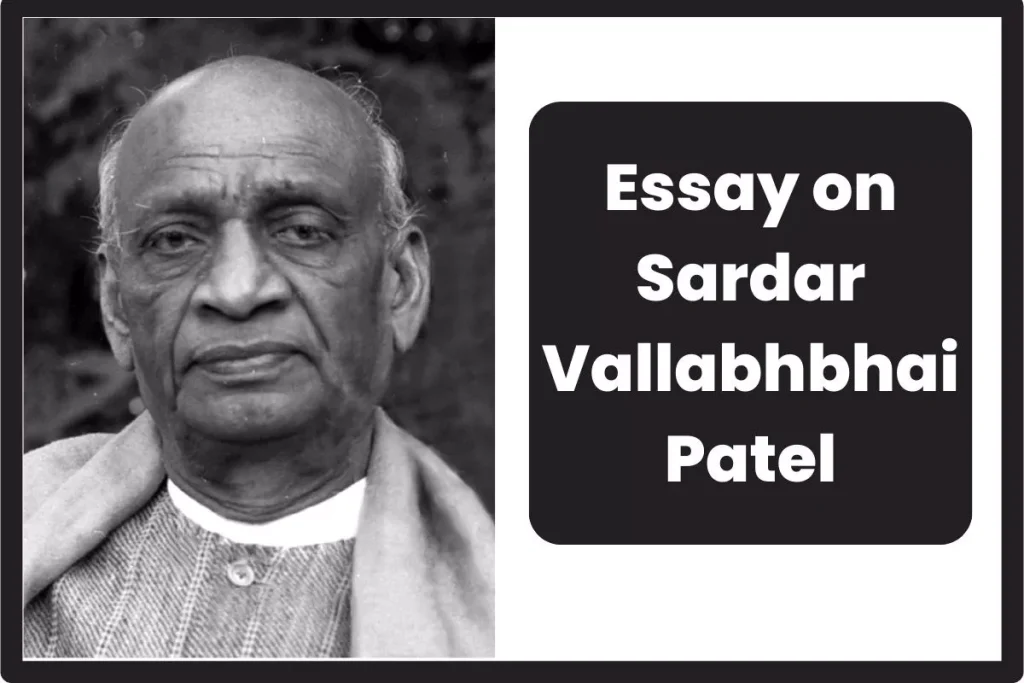Vallabhbhai Jhaverbhai Patel, commonly known as Sardar Vallabhbhai Patel, is a nationalist who has made many efforts to make India an Independent Country. The country remembers him and his efforts very well. Children and every citizen of India need to know him and his tremendous work. In the following article, we are providing the readers with the Essay on Sardar Vallabhbhai Patel in English.
The essay is going to provide essential information about Sardar Patel in an essay format. Readers who are going to be with the article till the very end will end up learning many things about Sardar Vallabhbhai Patel.
Essay on Sardar Vallabhbhai Patel in English

We have prepared one long and one short essay in the following article. By going through this, you will get to learn about his personality and can also frame the same to their essays. Sardar Patel was born on 31 October 1985, and we commemorate this day as National Unity Day. Do you know why? Because, when he was serving as Home Minister of India, he was credited for the consolidation of more than 550 independent princely states into India between 1947 and 1949 by the Independence Act (1947). He is also known as the “Bismarck of India”. Scroll down the page to learn more about Sardar Vallabhbhai Patel.
Short Essay on Vallabhbhai Jhaverbhai Patel
Vallabhbhai Jhaverbhai Patel, who is famously known as Sardar Vallabhbhai Patel, was a nationalist of India Independence as well as barrister. He served the nation by becoming the first Home Minister of India and Deputy Prime Minister of India. He served the nation in these roles between 1947 to 1950.
He was a very active member of the Indian National Congress party. The actual date of birth of Sardar Vallabhbhai Patel was never recorded formally. However, according to the papers given by him in the matriculation exam, he was born on 31 October 1875. Vallabhbhai Patel was born in Nadia, Gujarat, India.
His father’s name was Jhaverbhai Patel and his mother’s name was Ladba. Including Vallabhbhai Patel, they were a total of 6 siblings. Sardar Vallabhbhai Patel believed in Mahatma Gandhi and his views on non-violence. He was a follower of principles followed by Mahatma Gandhi.
He believed that there was a requirement for unity among Indian citizens to get the country free from British rule. Sardar Vallabhbhai Patel has played an essential part in India’s integration. He managed to convince all the princely states to support and become a part of India post the independence of India.
Apart from his original personal name, he was also known as Sardar Patel, Bismarck of India, Uniter of India and others. The country has been celebrating Rashtriya Ekta Diwas on his birth anniversary, i.e., 31 October every year since 2014. For this, the country also made the tallest statue in the world, which was inaugurated on 31 October 2018 to dedicate the statue to him.
The name of the statue is the ‘Statue of Unity’. The statue is located in Gujarat state of India. The height of the Statue of Unity is around 182 meters. Sardar Vallabhbhai Patel also got the Republic of India- the Bharat Ratna Award, the highest civilian award in 1991.
During the summer of 1950, Sardar Vallabhbhai Patel started getting ill. He had a heart attack on 15 December 1950, and then he lost his life at Birla House in Bombay, which is currently known as Mumbai.
Long Essay on Sardar Vallabhbhai Patel in English
Sardar Vallabhbhai Patel was born in the village of Gujarat Nadiad along with the Lauva Patel Patidar Community. He was born on 31 October 1875. The full name of Sardar Vallabhbhai Patel is Vallabhbhai Jhaverbhai Patel. His mother’s name was Ladbhai, who had a spiritual bent. His father’s name was Zaverbhai Patel. He worked in the Army of Rani Laxmi Bai, who was the Queen of Jhansi.
Sardar Patel was known for his bravery. He finished his matriculation at the age of 22. The reason behind completing it so late has been assumed that he used to work in regular occupations. However, it did not stop; he completed his education by earning a graduation degree in Law.
Afterwards, he moved to England, where he practised law as a barrister. After that, he came back to India and practised law in Ahmedabad, Gujarat. Sardar Vallabhbhai later became a member of the Indian National Congress. He was elected as the Secretary for Gujarat in 1917.
After the flood in Kaira in 1918, he protested and questioned the British practice of taxing the farmers. He convinced the Britishers to give back the land of the farmers. Later on, he received the “Sardar” title for his effort to demand the land back from the Britishers and also to unite the local farmers.
In 1928, the Bardoli farmers faced the issue of tax hikes. Farmers lost their lands as they were not able to pay the levy. Vallabhbhai Patel made a negotiation with the government from the farmers’ representative and gave the land back to the farmers.
The non-cooperative movement started by Mahatma Gandhi got huge support from Patel. They travelled nationwide together and joined 300,00 new members, gathering more than 1.5 million people. The government imprisoned Sardar Vallabhbhai Patel in 1950 as he was involved in the Salt Satyagraha Movement initiated by Mahatma Gandhi.
When Mahatma Gandhi was imprisoned, Patel made every effort to support the Satyagraha Movement and successfully expanded it throughout Gujarat. The health of Sardar Patel started to deteriorate in 1950. Doctors have declared that he was not going to live very long.
After a few months, he was forced to be on bed rest when his physical health started deteriorating. He had a heart attack on December 15 1950 and later died. Sardar Vallabhbhai Patel has created a huge impact on freeing Indians from British rule.
He is one of the leaders who can awaken patriotism in people. He is a role model to many people. In 1991, he was awarded the Bharat Ratna Award for his work and efforts to make India a proud country.






